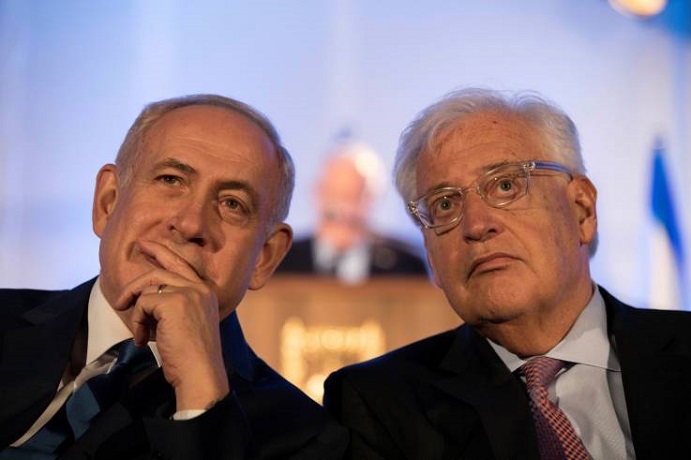David Friedman gives interview to The New York Times: ‘Israel has right to some, but unlikely all’ of disputed territory
Reuters / June 8, 2019
The US ambassador to Israel did not rule out an Israeli move to annex parts of the occupied West Bank, land the Palestinians seek for a state, in an interview with The New York Times published on Saturday.
Israel’s prime minister, Benjamin Netanyahu, said in the run-up to an April election that he plans to annex Jewish settlements in the West Bank, a move bound to trigger widespread international condemnation and complicate peace efforts.
The Times said US ambassador David Friedman declined to say how Washington would respond to annexation, but remarked: “We really don’t have a view until we understand how much, on what terms, why does it make sense, why is it good for Israel, why is it good for the region, why does it not create more problems than it solves.
“These are all things that we’d want to understand, and I don’t want to prejudge.”
The White House has been working on a proposal for peace between Israel and the Palestinians, dubbed by Donald Trump “the deal of the century”. It has not disclosed any of its details. In an interview with Axios last week White House adviser Jared Kushner cast doubt on Palestinian abilities to self-govern.
Most countries view Israeli settlements in the West Bank, territory captured in the 1967 Arab-Israeli war, as illegal. Israel disputes this, citing historical, political and religious ties as well as security needs.
Friedman said that under certain circumstances, “Israel has the right to retain some, but unlikely all, of the West Bank”.
It was unclear which West Bank territories Friedman meant and whether Israel’s retention would be part of a peace accord that includes land swaps – an idea floated in past negotiations – rather than a unilateral move such as annexation.
Responding to Friedman, Palestinian chief negotiator Saeb Erekat said: “Their vision is about annexation of occupied territory, a war crime under international law.”
The Trump plan had been expected to be unveiled during an economic conference in Bahrain this month. But a snap election in Israel set for 17 September is likely to delay the rollout.
Palestinian leadership has refused to deal with the Trump administration since it recognised Jerusalem as Israel’s capital. Palestinians want the eastern part of the city, captured by Israel in 1967 and annexed in a move unrecognised abroad, as their future capital.
In March, Trump recognised Israeli sovereignty over the Golan Heights, territory Israel captured from Syria in the same war and later annexed.
Netanyahu told army radio in April that Trump’s Golan step showed it was possible to annex West Bank settlements “within a gradual process and I prefer to do so with American recognition”.
He added: “I have been discussing the question of extending sovereignty with the Americans for the past six months.”
A US official, speaking on condition of anonymity, said: “No plan for unilateral annexation by Israel of any portion of the West Bank has been presented by Israel to the US, nor is it under discussion.”













